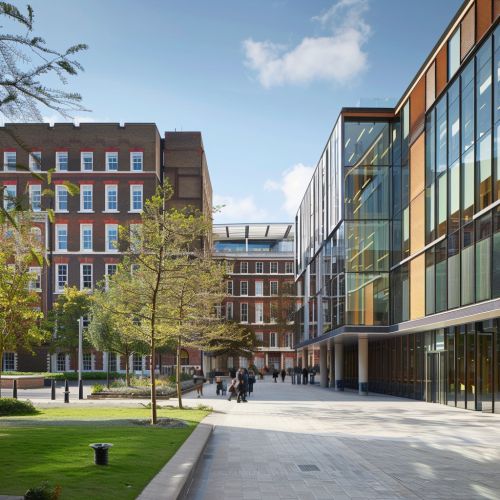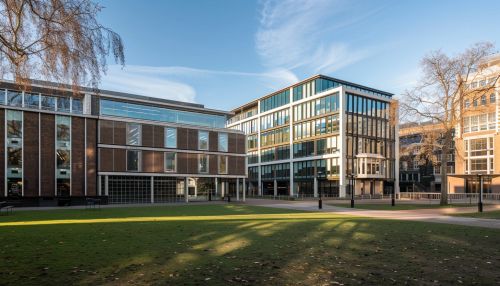University College London: Difference between revisions
(Created page with "== History == University College London (UCL) was founded in 1826 as London University by founders inspired by the radical ideas of Jeremy Bentham. It was the first university institution to be established in London and the first in England to admit students regardless of their religion. UCL was also the first university to admit women on equal terms with men, in 1878. The institution was renamed University College London in 1836 when it became a constituent college of...") |
No edit summary |
||
| Line 7: | Line 7: | ||
UCL's main campus is located in the Bloomsbury area of central London. The campus is home to a variety of historic and modern buildings, including the iconic Wilkins Building, which houses the main library and the UCL Main Quad. The Bloomsbury campus also includes the Cruciform Building, the Institute of Education, and the School of Pharmacy. UCL has additional campuses and facilities across London, including the UCL East campus in Stratford and the UCL Medical School's teaching hospitals. | UCL's main campus is located in the Bloomsbury area of central London. The campus is home to a variety of historic and modern buildings, including the iconic Wilkins Building, which houses the main library and the UCL Main Quad. The Bloomsbury campus also includes the Cruciform Building, the Institute of Education, and the School of Pharmacy. UCL has additional campuses and facilities across London, including the UCL East campus in Stratford and the UCL Medical School's teaching hospitals. | ||
[[Image:Detail-93141.jpg|thumb|center|UCL Bloomsbury campus with historic and modern buildings.|class=only_on_mobile]] | |||
[[Image:Detail-93142.jpg|thumb|center|UCL Bloomsbury campus with historic and modern buildings.|class=only_on_desktop]] | |||
== Academics == | == Academics == | ||
Latest revision as of 01:06, 22 June 2024
History
University College London (UCL) was founded in 1826 as London University by founders inspired by the radical ideas of Jeremy Bentham. It was the first university institution to be established in London and the first in England to admit students regardless of their religion. UCL was also the first university to admit women on equal terms with men, in 1878. The institution was renamed University College London in 1836 when it became a constituent college of the University of London.
Campus
UCL's main campus is located in the Bloomsbury area of central London. The campus is home to a variety of historic and modern buildings, including the iconic Wilkins Building, which houses the main library and the UCL Main Quad. The Bloomsbury campus also includes the Cruciform Building, the Institute of Education, and the School of Pharmacy. UCL has additional campuses and facilities across London, including the UCL East campus in Stratford and the UCL Medical School's teaching hospitals.


Academics
UCL offers a wide range of undergraduate and postgraduate programs across various disciplines. The university is organized into 11 faculties, including the Faculty of Arts and Humanities, the Faculty of Brain Sciences, the Faculty of Engineering Sciences, and the Faculty of Medical Sciences. UCL is known for its interdisciplinary approach to education and research, encouraging collaboration across different fields of study.
Research
UCL is a leading research institution, consistently ranking among the top universities in the world for research output and impact. The university is home to numerous research centers and institutes, including the UCL Institute of Education, the UCL Institute of Neurology, and the UCL Institute for Sustainable Resources. UCL researchers have made significant contributions to various fields, including neuroscience, genetics, and environmental science.
Notable Alumni
UCL has produced many notable alumni, including political leaders, scientists, and artists. Some of the most prominent alumni include Mahatma Gandhi, the leader of the Indian independence movement; Alexander Graham Bell, the inventor of the telephone; and Christopher Nolan, the acclaimed film director. UCL alumni have also received numerous prestigious awards, including Nobel Prizes and Fields Medals.
Student Life
UCL offers a vibrant student life with a wide range of extracurricular activities and student organizations. The university has over 250 student societies and clubs, catering to various interests, including academic, cultural, and recreational activities. UCL also has a strong tradition of student activism and community engagement, with students participating in various social and political causes.
